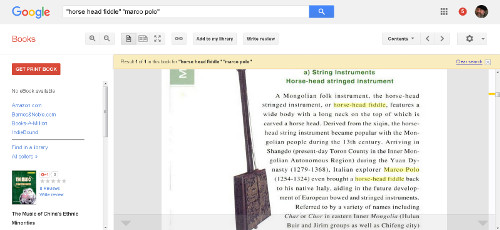L. Neil Smith’s THE LIBERTARIAN ENTERPRISE
Number 921, May 7, 2017
live through the experience of being in
jail. So, do what I do. Be pleasant.
Violon Chinois
by J. Neil Schulman
[email protected]
Special to L. Neil Smith’s The Libertarian Enterprise
Back in 1999 when I spent a couple of days at Epcot/Disney World I saw a performance of an ethnic Mongolian group performing on traditional Chinese musical instruments.
One of the traditional musical instruments was the Mongolian “horsehead fiddle.”
This is an instrument sized in between a viola and a cello, placed between the knees of the performer while sitting, and bowed like a cello. But just listening to it I knew I was seeing and hearing the grand-pappy of the modern string instruments that came out of Italy, particularly Cremona, ancestor to my father’s 1716 Guarnerius violin. In a November 1985 trip to Italy (obviously prior to my 1999 visit to Epcot) I’d visited the Stradivarius museum in Cremona which contained Stradivarius, Guarnerius, Amati, and other such violins, violas, and cellos.
One of the Chinese musicians performing at Epcot spoke English. I asked how far back in history the horsehead fiddle went and where it originated. The answer came back after discussion among the musicians that it was played in Inner Mongolia in the 12th century—well before Marco Polo’s 13th century visit to the region. I asked the Chinese musicians if Marco Polo could have brought back a horsehead fiddle with him to Italy. They didn’t know but said it was possible.
From that experience and conversation I concluded that Marco Polo must have brought a horsehead fiddle back to Italy, and it became the basis for the modern Italian-developed string instruments.
Ironically, as seen in the movie The Red Violin, when Mao’s Cultural Revolution was destroying violins as Western contamination they were actually destroying their own cultural heritage.
I was unable to prove the direct connection until—with my sister’s help—we found the proof I’d been looking for:

click image for larger version"
So it turns out that while I’m not anywhere the musician my dad was, I’m not half bad at being a cultural anthropological musicologist.
J Neil Schulman
Note: A web page I made about my father’s Guarnerius violin when my mom and I were selling it back in 2005 is still up at Million Dollar Violin.
Julius Schulman: Life With a Violin
Julius Schulman Violin Hero
Julius Schulman YouTube Channel

J. Neil Schulman is a novelist, screenwriter, journalist, radio personality, filmmaker, composer, and actor. His dozen books include the novels Alongside Night and The Rainbow Cadenza, both of which won the Libertarian Futurist Society’s Prometheus Award for best libertarian novel, and the anthology Nasty, Brutish, And Short Stories. Read more about him.
Was that worth reading?
Then why not:
Just click the red box (it's a button!) to pay the author
![]()
This site may receive compensation if a product is purchased
through one of our partner or affiliate referral links. You
already know that, of course, but this is part of the FTC Disclosure
Policy found here. (Warning: this is a 2,359,896-byte 53-page PDF file!)
TLE AFFILIATE
![]()

